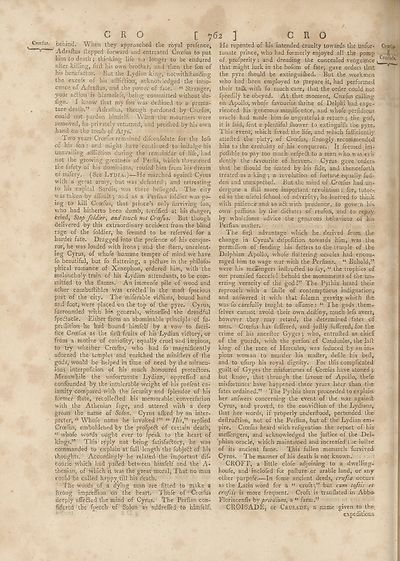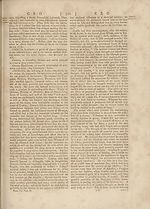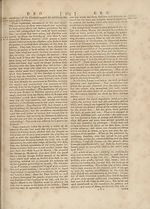Encyclopaedia Britannica, or, a Dictionary of arts, sciences, and miscellaneous literature : enlarged and improved. Illustrated with nearly six hundred engravings > Volume 6, CHI-Crystallization
(808) Page 762
Download files
Complete book:
Individual page:
Thumbnail gallery: Grid view | List view

C R G
€j'ceil‘;- behind. When they approached the royal prefence,
Adraftus flepped forward and entreated Croefus to put
him to death j thinking life no longer to be endured
after killing, firft his own brother, and then the fon of
hss benefaftor. But the Lydian king, notwithftanding
the excels of his affliftion, acknowledged the inno¬
cence of Adraftus, and the power of fate. “ Stranger,
your adtion is blamelefs, being committed without de-
ftgn. I know that my fon was deftined to a prema-
» ture death.” x\draftus, though pardoned by Croefus,
could not pardon himlelf. Wiled the mourners were
removed, he privately returned, and perifhed by his own
hand on the tomb of Atys.'
Two years Croefus remained difconfolate for the lofs
ct his fon : and might have continued to indulge his
unavailing afflidtion during the remainder of life, had
not the growing greatneis of Periia, Which threatened
the fafety of his dominions, roufed hira from his dream
of mifery, (See Lydia.)—He marched againft Cyrus
with a great army, but was defeated ; and retreating
to his capital Sardis, was there befieged. The city
rvas taken by aflauit j and as a Pevfian loldier was go¬
ing to kill Croefus, that prince’s only furviving Ion,
who had hitherto been dumb, terrified at his danger,
cried, Slop foldier, and touch not Croefus. But though
delivered by this extraordinary accidient from the blind
rage of the foldier, he feemed to be referved for a
harder fate. Dragged into the prefence of his conque¬
ror, he was loaded with irons j and the ftern, unrelent-
ing Cyrus, of whofe humane temper of mind we have
fo beautiful, but fo flattering, a pi61u?e in the philofo-
phical romance of Xenophon, ordered him, with the
melancholy train of his Lydian attendants, to be com-
rhitted to the flames. An immenfe pile of wood and
other combuftibles was erefled' in the moft fpacious
part of the city. The miferable vi&ims, bound hand
and foot, were placed on the top of the pyre. Cyrus,
furrounded with his generals, witneffed the dreadful
fpeftacle. Either from an abominable principle of fu-
perftition he had bound himfelf by a vow to facri-
fice Crcefus as the firft fruits of his Lydian vidfory, or
from a motive of curiofity, equally cruel and impious,
to try whether Croefus, who had fo magnificently
adorned the temples and enriched the minifters of the
gods, would be helped in time of need by the miracu¬
lous interpofition of his much honoured proteftors.
Meanwhile the unfortunate Lydian, opprefied and
confounded by the intolerable weight of his prefent ca¬
lamity compared with the fecurity and fplendor of his
former ftate, recolle£!ed his memorable eonverfation
with the Athenian fage, and uttered with a deep
groan the name of Scion. Cyrus afked by an inter¬
preter, “ Whofe name he invoked?” “ Hisf replied
Croefus, emboldeUed by the profpeft of certain death,
“ whofe wofds ought ever to fpeak to the heart of
kings.” This reply not being fatisfadfory, he was
commanded to explain at full length the fubjeft of his
thoughts. Accordingly he related the important dif-
courfe which had paffed between himfelf and the A-
ihenian, of which it Was the great moral, That no man
could be called happy till his death.
The words of a dying man are fitted to make a
ftrong impreflion on the heart. Thofe of Croefus
deeply afFeded the mind of Cyrus. The Perfian con-
fidered the fpeech of Solon as a.ddrdTed to himfelf..
[ 762 ]
c it o
He repented of his intended cruelty towards tire unfor¬
tunate prince, who had formerly enjoyed all the pomp
of profperity : and dreading the concealed vengeance ,
that might lurk in the bofom of fate, gave orders that
the pyre fhould be extinguiihed. But the workmen
who had been employed to prepare it, had performed
their talk with fo much care, that the order could not
fpeedily be obeyed. At that moment, Croefus calling
on Apollo, whofe favourite (brine of Delphi had expe¬
rienced his generous munificence, and whofe perfidious
oracle had made him io ungrateful a return 5 the god,
it is laid, fent a plentiful Ihower to extinguilh the pyre.
This event, which faved the life, and which lufficiently
attefted the piety, of Croefus, firongly recommended
him to the credulity of his conqueror. It feemtd im-
pollible to pay too much refpe£t to a man who was evk
dentiy the favourite of heaven. Cyrus gave orders
that he Ihould be feated by his fide, and thenceforth
treated as a king ; a revolution of fortune equally hid¬
den and unexpected. But the mind of Croefus had un¬
dergone a ftili more important revolution : for, tutor¬
ed in the ufelul febooi of adverfity, he learned to think
with patience and to aft with prudence, to govern his
own paflions by the dictates of reafon, and to repay
by wholefome advice the generous behaviour of his
Perfian matter.
The firft advantage which he derived from the
change in Cyrus’s dilpofidon towards him, was the
permiftion of fending his fetters to the temple of the
Delphian Apollo, whofe flattering oracles had encou¬
raged him to wage war with the Perfians. “ Behold,”
were his mdTengcrs inftrufted to fay, “ the trophies of
our pronflfed fuccefs! behold the monuments of the un¬
erring veracity of the god 1” The Pythia heard their
reproach with a fmile of contemptuous indignation,
and anfwercd it with that folemn gravity which ftie
was fo carefully taught to afiume : “ The gods them-
felves cannot avoid their own deftiny, much lefs avert,
however they may retard, the determined fates of.
men. Crcefus has fuffered, and juftly fuffered, for the
crime of his anceftor Gyges •, who, entrufted as chief
of the guards, with the perfon of Candaules, the laft
king of the race of Hercules, was leduced by an im¬
pious woman to murder his mafter, defile his bed,
and to ufurp his royal dignity. For this complicated
guilt of Gyges the misfortunes of Crcefus have atoned 5
but know, that through the favour of Apollo, thefe
misfortunes have happened three years later than the
fates ordained.” The Pythia then proceeded to explain
her anfwers concerning the event of the war againft
Cyrus, and proved, to the conviftion of the Lydians,
that her words, if prbperly underftood, portended the
deftruftion, not of the Perfian, but of the Lydian em¬
pire. Ctoefus heard with refignation the report of his
meflengers, and acknowledged the juftice of the Del¬
phian oracle, which maintained and increafed tire luflre
of its ancient fame. This fallen monarch furvived
Cyrus. The manner of his death is not known.
CROFT, a little clofe adjoining to a dwelling-
houte, and inclofed for pafture or arable land, or any
other purpofe.—In feme ancient deeds, cruft a occurs
as the Latin word for a “ croftbut cum toftis et
crofiis is more frequent. Croft is tranftated in Abbo
Floriacenfis bv preedium, a “ farm.”
CROISADE, or Crusade, a name given to the.
expeditions
Crocfuj
12
Croifade.
€j'ceil‘;- behind. When they approached the royal prefence,
Adraftus flepped forward and entreated Croefus to put
him to death j thinking life no longer to be endured
after killing, firft his own brother, and then the fon of
hss benefaftor. But the Lydian king, notwithftanding
the excels of his affliftion, acknowledged the inno¬
cence of Adraftus, and the power of fate. “ Stranger,
your adtion is blamelefs, being committed without de-
ftgn. I know that my fon was deftined to a prema-
» ture death.” x\draftus, though pardoned by Croefus,
could not pardon himlelf. Wiled the mourners were
removed, he privately returned, and perifhed by his own
hand on the tomb of Atys.'
Two years Croefus remained difconfolate for the lofs
ct his fon : and might have continued to indulge his
unavailing afflidtion during the remainder of life, had
not the growing greatneis of Periia, Which threatened
the fafety of his dominions, roufed hira from his dream
of mifery, (See Lydia.)—He marched againft Cyrus
with a great army, but was defeated ; and retreating
to his capital Sardis, was there befieged. The city
rvas taken by aflauit j and as a Pevfian loldier was go¬
ing to kill Croefus, that prince’s only furviving Ion,
who had hitherto been dumb, terrified at his danger,
cried, Slop foldier, and touch not Croefus. But though
delivered by this extraordinary accidient from the blind
rage of the foldier, he feemed to be referved for a
harder fate. Dragged into the prefence of his conque¬
ror, he was loaded with irons j and the ftern, unrelent-
ing Cyrus, of whofe humane temper of mind we have
fo beautiful, but fo flattering, a pi61u?e in the philofo-
phical romance of Xenophon, ordered him, with the
melancholy train of his Lydian attendants, to be com-
rhitted to the flames. An immenfe pile of wood and
other combuftibles was erefled' in the moft fpacious
part of the city. The miferable vi&ims, bound hand
and foot, were placed on the top of the pyre. Cyrus,
furrounded with his generals, witneffed the dreadful
fpeftacle. Either from an abominable principle of fu-
perftition he had bound himfelf by a vow to facri-
fice Crcefus as the firft fruits of his Lydian vidfory, or
from a motive of curiofity, equally cruel and impious,
to try whether Croefus, who had fo magnificently
adorned the temples and enriched the minifters of the
gods, would be helped in time of need by the miracu¬
lous interpofition of his much honoured proteftors.
Meanwhile the unfortunate Lydian, opprefied and
confounded by the intolerable weight of his prefent ca¬
lamity compared with the fecurity and fplendor of his
former ftate, recolle£!ed his memorable eonverfation
with the Athenian fage, and uttered with a deep
groan the name of Scion. Cyrus afked by an inter¬
preter, “ Whofe name he invoked?” “ Hisf replied
Croefus, emboldeUed by the profpeft of certain death,
“ whofe wofds ought ever to fpeak to the heart of
kings.” This reply not being fatisfadfory, he was
commanded to explain at full length the fubjeft of his
thoughts. Accordingly he related the important dif-
courfe which had paffed between himfelf and the A-
ihenian, of which it Was the great moral, That no man
could be called happy till his death.
The words of a dying man are fitted to make a
ftrong impreflion on the heart. Thofe of Croefus
deeply afFeded the mind of Cyrus. The Perfian con-
fidered the fpeech of Solon as a.ddrdTed to himfelf..
[ 762 ]
c it o
He repented of his intended cruelty towards tire unfor¬
tunate prince, who had formerly enjoyed all the pomp
of profperity : and dreading the concealed vengeance ,
that might lurk in the bofom of fate, gave orders that
the pyre fhould be extinguiihed. But the workmen
who had been employed to prepare it, had performed
their talk with fo much care, that the order could not
fpeedily be obeyed. At that moment, Croefus calling
on Apollo, whofe favourite (brine of Delphi had expe¬
rienced his generous munificence, and whofe perfidious
oracle had made him io ungrateful a return 5 the god,
it is laid, fent a plentiful Ihower to extinguilh the pyre.
This event, which faved the life, and which lufficiently
attefted the piety, of Croefus, firongly recommended
him to the credulity of his conqueror. It feemtd im-
pollible to pay too much refpe£t to a man who was evk
dentiy the favourite of heaven. Cyrus gave orders
that he Ihould be feated by his fide, and thenceforth
treated as a king ; a revolution of fortune equally hid¬
den and unexpected. But the mind of Croefus had un¬
dergone a ftili more important revolution : for, tutor¬
ed in the ufelul febooi of adverfity, he learned to think
with patience and to aft with prudence, to govern his
own paflions by the dictates of reafon, and to repay
by wholefome advice the generous behaviour of his
Perfian matter.
The firft advantage which he derived from the
change in Cyrus’s dilpofidon towards him, was the
permiftion of fending his fetters to the temple of the
Delphian Apollo, whofe flattering oracles had encou¬
raged him to wage war with the Perfians. “ Behold,”
were his mdTengcrs inftrufted to fay, “ the trophies of
our pronflfed fuccefs! behold the monuments of the un¬
erring veracity of the god 1” The Pythia heard their
reproach with a fmile of contemptuous indignation,
and anfwercd it with that folemn gravity which ftie
was fo carefully taught to afiume : “ The gods them-
felves cannot avoid their own deftiny, much lefs avert,
however they may retard, the determined fates of.
men. Crcefus has fuffered, and juftly fuffered, for the
crime of his anceftor Gyges •, who, entrufted as chief
of the guards, with the perfon of Candaules, the laft
king of the race of Hercules, was leduced by an im¬
pious woman to murder his mafter, defile his bed,
and to ufurp his royal dignity. For this complicated
guilt of Gyges the misfortunes of Crcefus have atoned 5
but know, that through the favour of Apollo, thefe
misfortunes have happened three years later than the
fates ordained.” The Pythia then proceeded to explain
her anfwers concerning the event of the war againft
Cyrus, and proved, to the conviftion of the Lydians,
that her words, if prbperly underftood, portended the
deftruftion, not of the Perfian, but of the Lydian em¬
pire. Ctoefus heard with refignation the report of his
meflengers, and acknowledged the juftice of the Del¬
phian oracle, which maintained and increafed tire luflre
of its ancient fame. This fallen monarch furvived
Cyrus. The manner of his death is not known.
CROFT, a little clofe adjoining to a dwelling-
houte, and inclofed for pafture or arable land, or any
other purpofe.—In feme ancient deeds, cruft a occurs
as the Latin word for a “ croftbut cum toftis et
crofiis is more frequent. Croft is tranftated in Abbo
Floriacenfis bv preedium, a “ farm.”
CROISADE, or Crusade, a name given to the.
expeditions
Crocfuj
12
Croifade.
Set display mode to:
![]() Universal Viewer |
Universal Viewer | ![]() Mirador |
Large image | Transcription
Mirador |
Large image | Transcription
Images and transcriptions on this page, including medium image downloads, may be used under the Creative Commons Attribution 4.0 International Licence unless otherwise stated. ![]()
| Permanent URL | https://digital.nls.uk/193017927 |
|---|
| Attribution and copyright: |
|
|---|
| Description | Ten editions of 'Encyclopaedia Britannica', issued from 1768-1903, in 231 volumes. Originally issued in 100 weekly parts (3 volumes) between 1768 and 1771 by publishers: Colin Macfarquhar and Andrew Bell (Edinburgh); editor: William Smellie: engraver: Andrew Bell. Expanded editions in the 19th century featured more volumes and contributions from leading experts in their fields. Managed and published in Edinburgh up to the 9th edition (25 volumes, from 1875-1889); the 10th edition (1902-1903) re-issued the 9th edition, with 11 supplementary volumes. |
|---|---|
| Additional NLS resources: |
|

